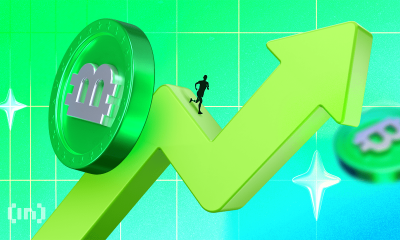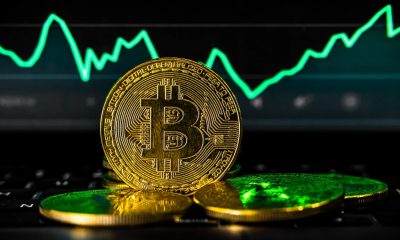Bitcoin
Bitcoin Reserve Campaign Expands With VanEck’s Endorsement
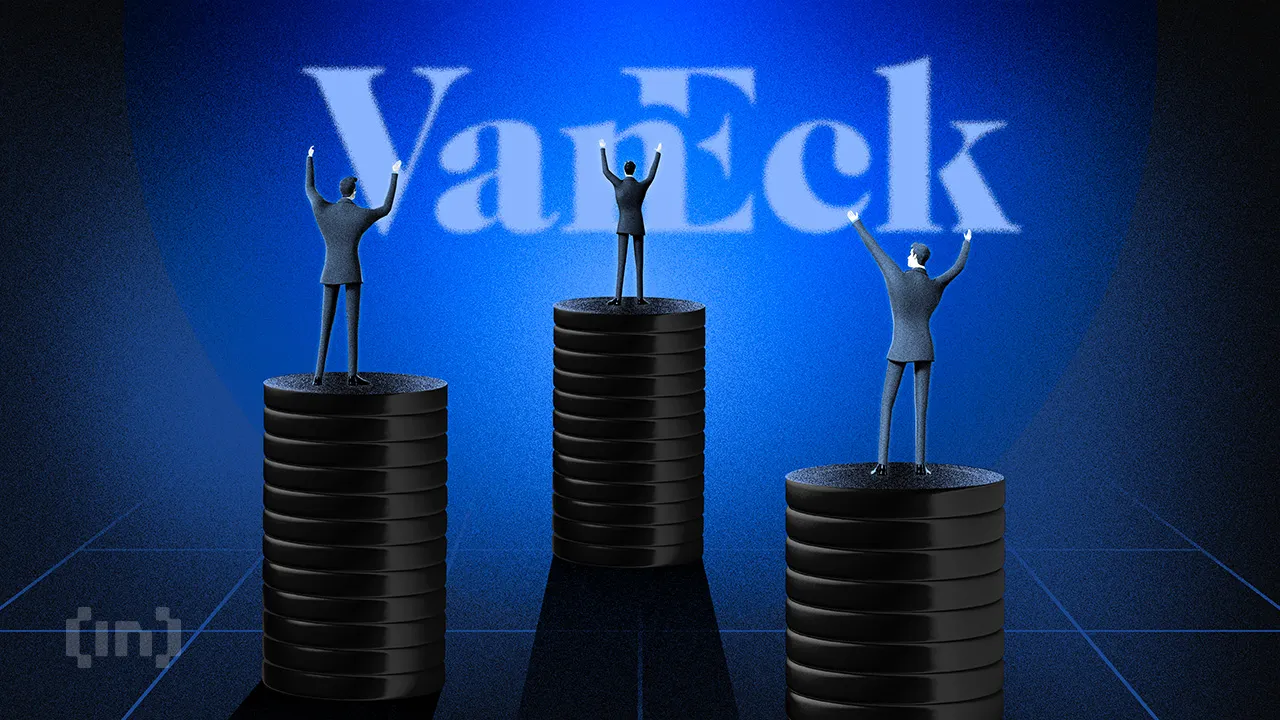
The Bitcoin reserve campaign in the US continues to gain momentum, with more players showing support by the day. With endorsements at state and national levels, prospects continue to grow for the US stockpile of Bitcoin (BTC) to reach 1 million coins eventually.
Nevertheless, skeptics also exist, with some pushing that a Bitcoin reserve would be detrimental to the United States.
VanEck Joins Bitcoin Reserve Campaign
VanEck’s head of research, Mathew Sigel, announced the company’s full endorsement of a strategic Bitcoin reserve, signaling growing institutional support for the concept.
“FOR IMMEDIATE RELEASE: VanEck Endorses Strategic Bitcoin Reserve. No need for ‘sources’ — we’ll just tell you ourselves,” Sigel declared.
The Bitcoin Reserve movement, which aims to position Bitcoin as a national or state-held reserve asset, has been gaining traction. It follows President-elect Donald Trump’s public advocacy four months ago.
During a speech, Trump proposed replacing Gary Gensler at the SEC and highlighted Bitcoin’s potential to bolster national reserves. He said, “Bitcoin Reserve is the future,” sparking a wave of interest among policymakers and financial institutions.
Prominent political figures, including Senator Cynthia Lummis, have also lent their support. Lummis recently proposed selling portions of the US gold reserves to acquire Bitcoin. The senator, a long-time Bitcoin advocate, believes that diversifying the nation’s reserve assets with digital currencies could strengthen financial resilience. Her efforts have garnered bipartisan attention, with ongoing debates in Congress about the viability of such a move.
Meanwhile, US states are also entering the fray. Florida State’s CFO has publicly endorsed a Bitcoin reserve strategy. In the same way, Pennsylvania lawmakers recently introduced a bill advocating for a state-level Bitcoin reserve. These developments suggest a decentralized push toward integrating Bitcoin into government balance sheets.
The campaign has extended beyond US borders. Poland’s libertarian leader, Sławomir Mentzen, promised to pursue a national Bitcoin reserve strategy if elected. Mentzen’s pledge reflects the international appeal of Bitcoin as a modern monetary asset capable of countering inflationary pressures and enhancing fiscal sovereignty.
BlackRock’s Cautious Approach
Amid the rise of the BTC Reserve movement, BlackRock, the world’s largest asset manager, has adopted a more measured stance. While VanEck openly supports the concept, Fox Business correspondent Eleanor Terret reported that BlackRock is skeptical.
“Sources close to BlackRock tell Fox Business the big money manager is not endorsing a strategic BTC reserve despite recent reports that it is,” Terrett shared.
However, BlackRock’s actions paint a complex picture. The firm’s Bitcoin ETF recently surpassed $40 billion in assets under management (AUM), setting industry speed records. BlackRock has also increased its Bitcoin exposure by investing heavily in MicroStrategy, a company known for its substantial Bitcoin holdings. The asset manager also acquired $680 million in Bitcoin through its IBIT ETF and direct investments. Meanwhile, critics remain skeptical of BlackRock’s intentions.
“BlackRock is playing the Franklin Templeton game—they are pushing the ETF but know they are really here for the tokenization,” one user shared on X.
This viewpoint suggests that BlackRock’s endgame may be less about Bitcoin adoption and more about the broader application of blockchain technology for asset tokenization. Meanwhile, data on Arkham shows BlackRock’s Bitcoin stash has reached 471,707K BTC, valued at $43.53 billion as of this writing.
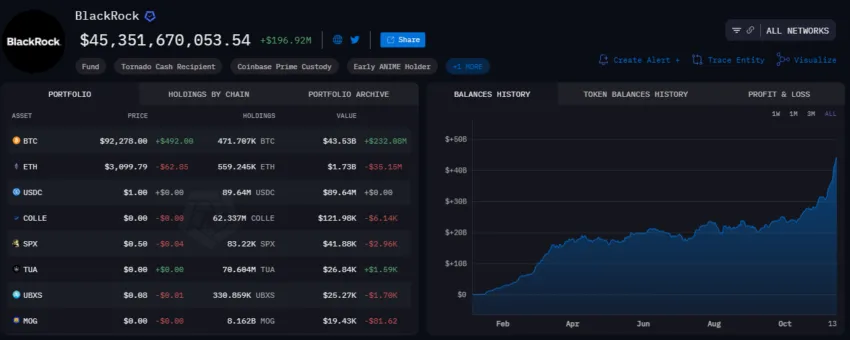
Adding to the skepticism, billionaire investor Mike Novogratz recently expressed doubt about the feasibility of a US Bitcoin reserve. Novogratz believes Bitcoin remains too volatile and politically divisive to become a core government asset in the near term.
“It’s a low probability. While the Republicans control the Senate, they don’t have close to 60 seats. I think that it would be very smart for the United States to take the Bitcoin they have and maybe add some to it… I don’t necessarily think that the dollar needs anything to back it up,” Novogratz claimed.
Despite divergent views, the BTC Reserve campaign has undeniably gained momentum. It has drawn attention from global policymakers, financial institutions, and private investors. Whether through state-led initiatives, international adoption, or institutional investments like BlackRock’s ETF, Bitcoin’s role in the global financial system continues to grow.
“In addition to the macro environment, there is a renewed sense of optimism that regulatory clarity for bitcoin and digital assets more broadly may emerge following the US election. President-elect Donald Trump campaigned on maintaining a strategic bitcoin reserve, while pro-crypto politicians in the House and Senate races from both sides of the aisle enjoyed electoral success. The macro-environment combined with supportive policies could combine to accelerate and broaden Bitcoin’s adoption,” BlackRock shared.
VanEck’s public endorsement, coupled with growing interest from figures like Senator Lummis and international leaders, could mark a tipping point in the integration of digital assets into mainstream financial strategies.
As debates intensify, the question remains whether Bitcoin will become the gold standard of the digital age or whether its volatility and skepticism from major players like BlackRock will hinder its adoption as a reserve asset.
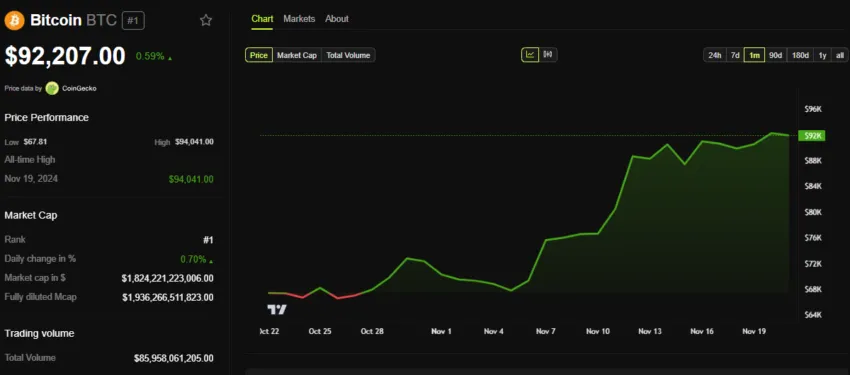
Bitcoin is up by a modest 0.59% as of this writing. BeInCrypto data shows the pioneer crypto is trading at $92,207.
Disclaimer
In adherence to the Trust Project guidelines, BeInCrypto is committed to unbiased, transparent reporting. This news article aims to provide accurate, timely information. However, readers are advised to verify facts independently and consult with a professional before making any decisions based on this content. Please note that our Terms and Conditions, Privacy Policy, and Disclaimers have been updated.
Bitcoin
Why Bitcoin Is Gaining Appeal Amid Falling US Treasury Yields

The US 10-year Treasury yield has fallen below 4% for the first time since October.
This signals a potential shift in Federal Reserve (Fed) policy, sparking renewed interest in Bitcoin (BTC) and other risk assets.
Treasury Yields and Bitcoin: A Risk-On Rotation?
As highlighted by financial markets aggregator Barchart, this decline reflects growing economic uncertainty. Specifically, it suggests rising recession fears and increasing speculation that the Fed may pivot to rate cuts sooner than expected.
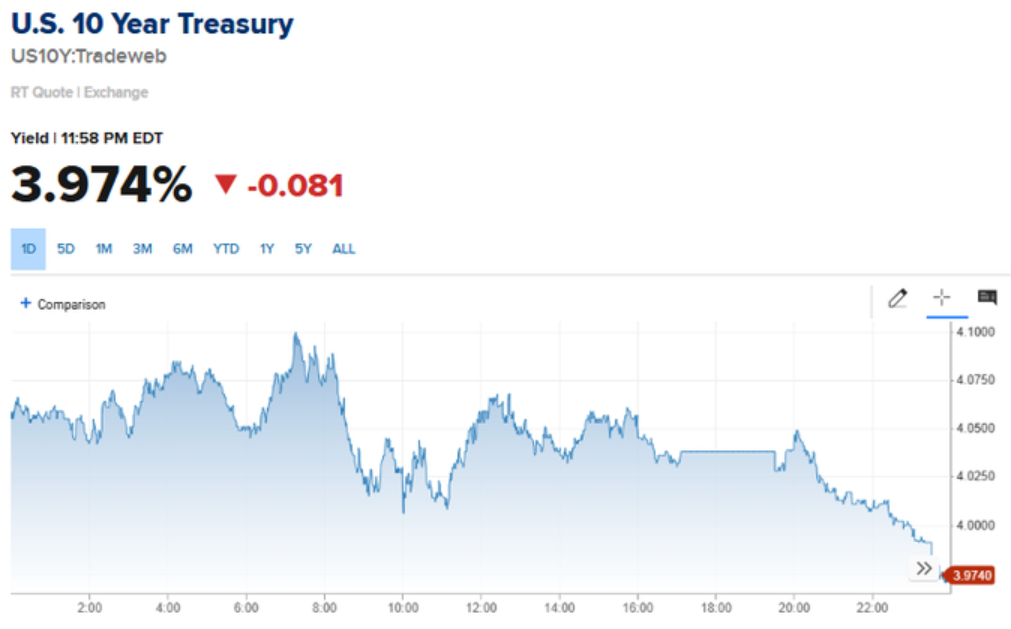
A drop in Treasury yields reduces the attractiveness of traditional safe-haven assets like bonds, often encouraging investors to seek higher returns elsewhere.
Historically, Bitcoin and altcoins have benefitted from such shifts, as declining real yields increase liquidity and risk appetite. Crypto analyst Dan Gambardello emphasized this connection. He noted that lower yields are bullish for Bitcoin, aligning with expectations that a dovish Fed will drive liquidity into riskier assets.
“The irony is that when yields fall, there’s less reason to sit in “safe” bonds— And ultimately more reason to chase returns in risk assets like BTC and alts. This is why you see risk-on bulls get excited when 10-year yields begin falling,” he stated.
Additionally, BitMEX founder and former CEO Arthur Hayes pointed out that the 2-year Treasury yield sharply declined after the new tariffs were introduced. He said this reinforced the market’s expectation of imminent Fed rate cuts.
“We need Fed easing, the 2yr treasury yield dumped after Tariff announcement because the market is telling us the Fed will be cutting soon and possibly restarting QE to counter -ve economic impact,” Hayes shared on X (Twitter).
Hayes previously projected that Bitcoin could surge as high as $250,000 if quantitative easing (QE) returns in response to economic downturns.
The Trump Factor: Tariffs and Market Volatility
Further, analysts have tied the yield drop to economic uncertainty triggered by Trump’s aggressive tariff strategy. As Gambardello noted, these tariffs have spurred a flight to safety, pushing bond prices higher and lowering yields.
This trend aligns with Trump’s broader economic approach of weakening the dollar and lowering interest rates, which historically benefit Bitcoin. During his first term, Trump frequently desired a weaker dollar and lower interest rates to boost exports and economic growth. He also pressured the Fed to cut rates multiple times.
Another analyst, Kristoffer Kepin, highlighted that the M2 money supply is growing. This reinforces expectations of increased liquidity entering the market further. This influx of capital could flow into Bitcoin and altcoins as investors seek alternative stores of value amid economic turbulence.
Despite Bitcoin’s potential upside, Goldman Sachs has recommended gold and the Japanese yen as preferred hedges against US recession risks. Specifically, the bank cited its historical performance in risk-off environments.
“The yen offers investors the best currency hedge should the chances of a US recession increase,” Bloomberg reported, citing Kamakshya Trivedi, head of global foreign exchange, interest rates, and emerging market strategy at Goldman Sachs.
The bank expressed the same sentiment toward gold, raising its forecast as investors buy the yellow metal. Similarly, a Bank of America (BofA) survey showed that 58% of fund managers prefer gold as a trade war haven, while only 3% back Bitcoin.
Meanwhile, JPMorgan has raised its global recession probability to 60%. Likewise, the multinational banking and financial services company attributed the increased risk to the economic shock from tariffs announced on Liberation Day.
“These policies, if sustained, would likely push the US and possibly global economy into recession this year,” wrote head of global economic research Bruce Kasman in a note late Thursday.
However, Kasman acknowledged that while a scenario where the rest of the world muddles through a US recession is possible, it is less likely than a global downturn.
As Treasury yields continue to fall and economic uncertainty mounts, the Fed becomes a key watch for investors for signs of a policy shift.
If rate cuts and liquidity injections materialize, Bitcoin could see substantial gains, particularly as traditional assets undergo re-pricing. However, as experts caution, short-term volatility remains a key risk factor amidst these market shifts.
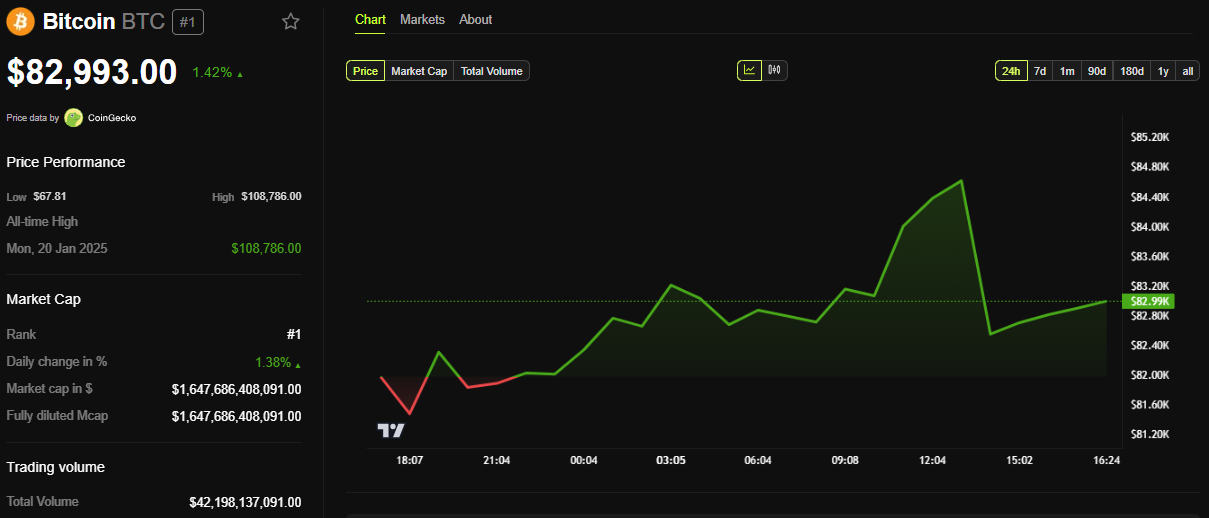
BeInCrypto data shows Bitcoin was trading for $82,993 as of this writing, up by a modest 1.42% in the last 24 hours.
Disclaimer
In adherence to the Trust Project guidelines, BeInCrypto is committed to unbiased, transparent reporting. This news article aims to provide accurate, timely information. However, readers are advised to verify facts independently and consult with a professional before making any decisions based on this content. Please note that our Terms and Conditions, Privacy Policy, and Disclaimers have been updated.
Bitcoin
Bitcoin Drops as China Escalates Trade War With 34% Tariff on US
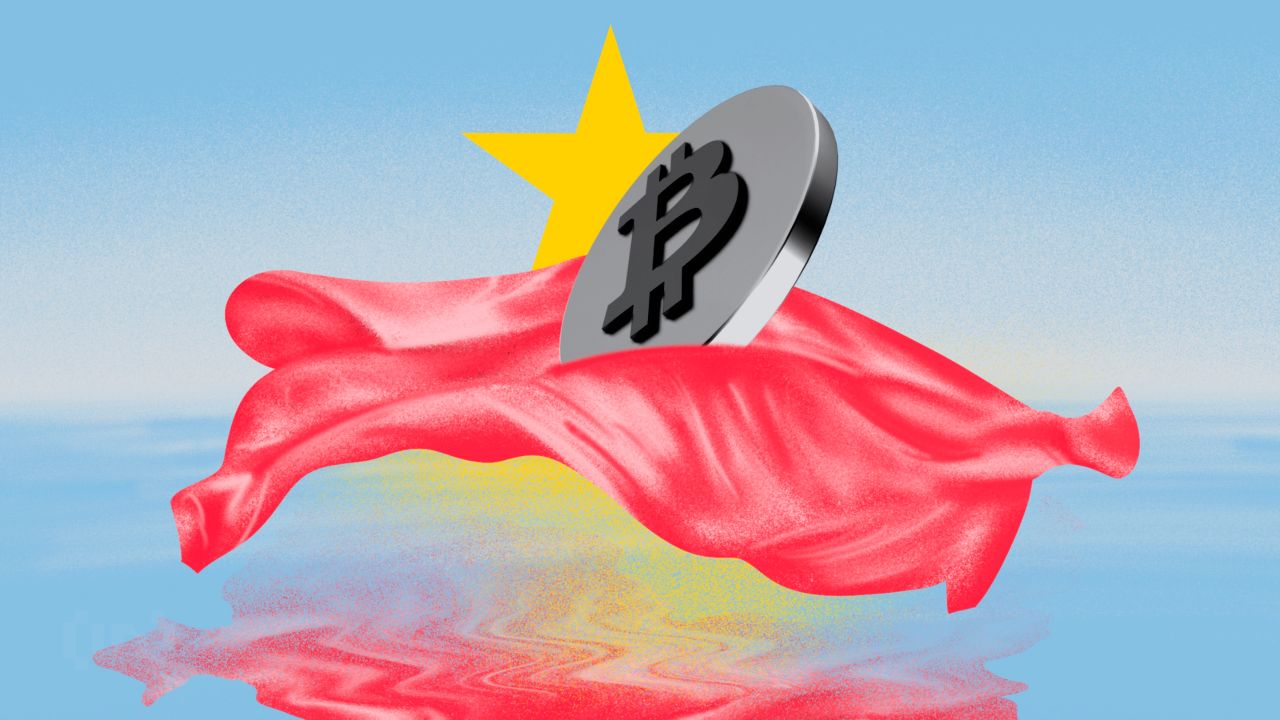
On April 4, 2025, China responded to the latest US tariff imposition by imposing an additional 34% tariff on all goods imported from the US. This escalates the already tense trade war between the two largest economies in the world.
Bitcoin dropped 3% within hours of the announcement, briefly falling below $82,000. This latest development has caused concern among investors, analysts, and participants in the cryptocurrency sector about its potential impact.
Bitcoin Investors Worry About The Escalating Trade War
According to Xinhua News Agency, China will impose a 34% tariff on all products imported from the US starting April 10. Xinhua reported that the US’s “Reciprocal Tariff” violated WTO rules, severely damaging the legal and legitimate rights of WTO members and undermining the multilateral trade system and the international trade order based on rules.
“This is a typical act of unilateral hegemony that harms the stability of the global economic and trade order. China firmly opposes this,” The spokesperson for the Ministry of Commerce said in an interview about China’s lawsuit against the US’s “Reciprocal Tariff” at the WTO.
Previously, President Trump had imposed a 34% tariff on China in addition to the 20% tariffs already imposed in two phases. This means a total of 54% tariffs were applied to China.
News from China has caused concern among crypto investors. On April 4, Bitcoin’s price dropped from $84,600 to $82,000, a 3% decrease.
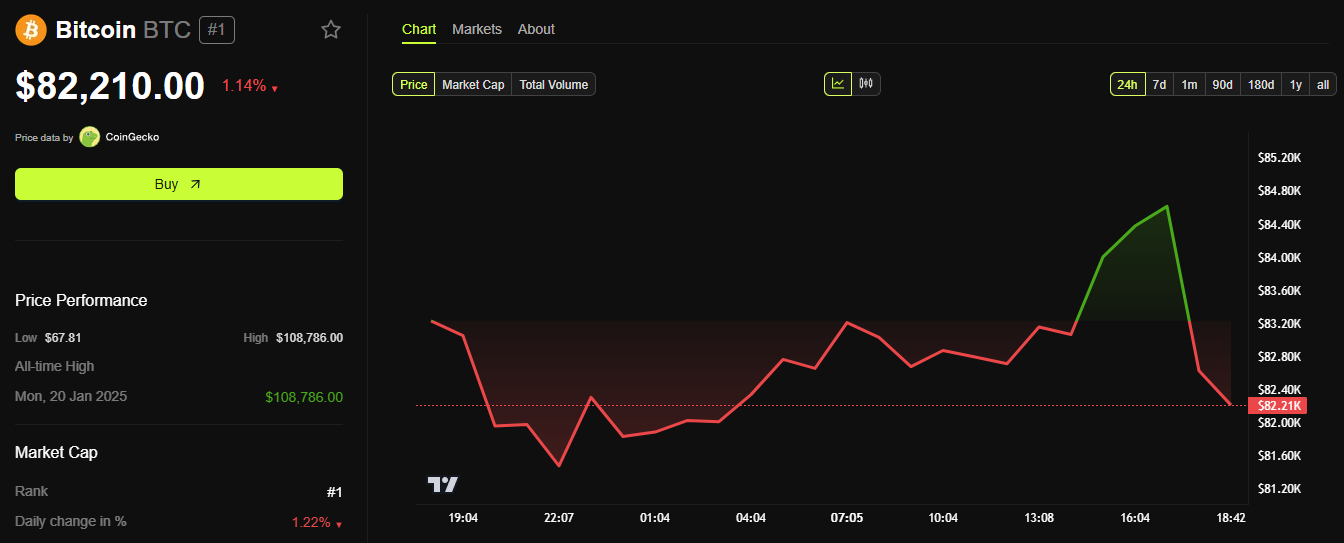
At the same time, following the news, the Long/Short ratio of Bitcoin dropped below 1, indicating a growing sentiment for short-selling, which has become dominant in the market.

Both Bitcoin and other markets have been affected. The S&P 500 fell from 5,260 points to 5,250 points, while the Dow Jones Industrial Average dropped from 41,100 points to 40,500 points. China’s actions have raised concerns about the potential escalation of the global trade war.
“The ‘Third World War’ of the trade war has begun,” The Kobeissi Letter commented.
What Will Happen to Bitcoin When The US-China Trade War Escalates?
This cryptocurrency, often praised as a hedge against economic instability, tends to behave like a risky asset during sudden uncertain periods. Historical patterns support this reaction—during the US-China trade war in 2018-2019, Bitcoin experienced significant sell-offs as tariffs escalated, only recovering when the narrative of value preservation took precedence.
A significant portion of the global cryptocurrency hardware supply chain comes from China, where companies like Bitmain dominate the production of ASIC mining machines—important devices for Bitcoin mining.
With the US now facing a 34% tariff on technology imports from China, the cost of importing these mining machines is expected to rise dramatically. Bitcoin miners in the US, already facing high energy costs and competitive pressure on hashrate, may see their profits shrink further.
However, the long-term outlook for Bitcoin may not be as bleak as the initial market reaction. Some analysts suggest that prolonged trade wars and economic friction could enhance Bitcoin’s appeal as a decentralized asset unaffected by government intervention. If tariffs lead to inflation or weaken fiat currencies like the USD, investors may turn to cryptocurrencies as a safe haven.
“It’s not gold, and it’s not the yen. Instead, Bitcoin is emerging as a risk-dynamic asset – one that doesn’t crumble like high-growth stocks but also doesn’t attract the same flight-to-safety flows as traditional safe havens,” Nexo Dispatch Editor Stella Zlatarev told BeInCrypto.
This sentiment aligns with research indicating that instability often causes initial price drops but can pave the way for growth as acceptance increases.
Disclaimer
In adherence to the Trust Project guidelines, BeInCrypto is committed to unbiased, transparent reporting. This news article aims to provide accurate, timely information. However, readers are advised to verify facts independently and consult with a professional before making any decisions based on this content. Please note that our Terms and Conditions, Privacy Policy, and Disclaimers have been updated.
Bitcoin
Fresh $36M Bitcoin Transfer By Bhutan Sparks Speculation—Dump Alert?
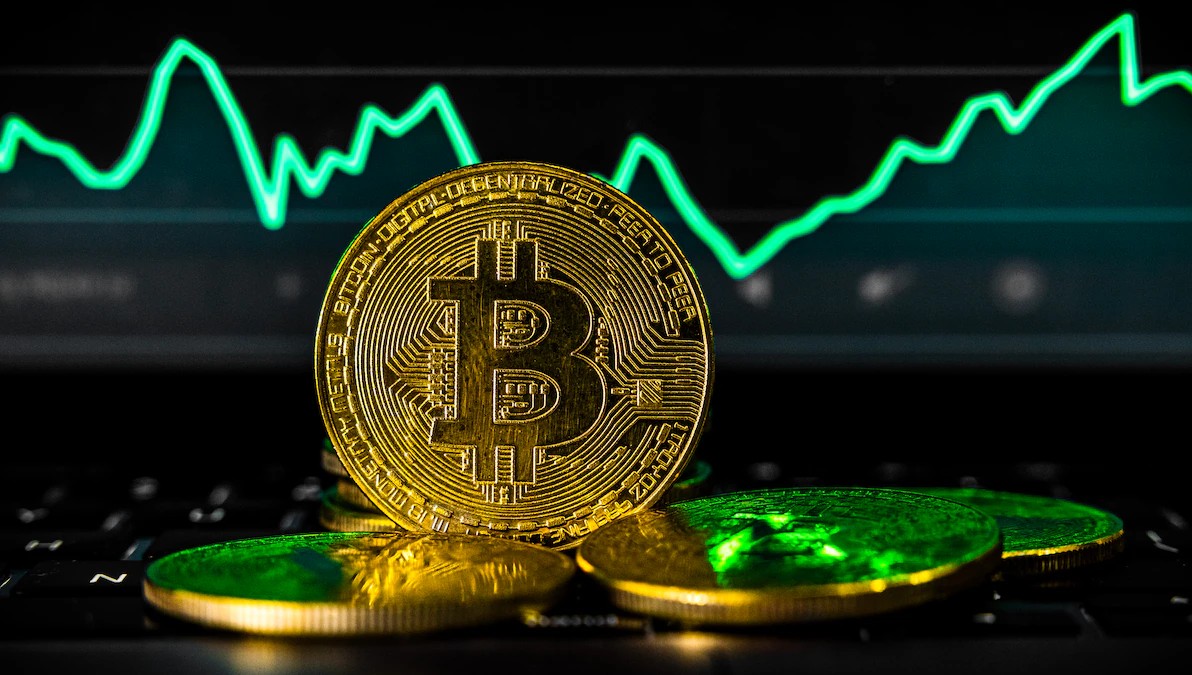

A series of Bitcoin transfers from wallets linked to the Bhutanese government has caught the attention of cryptocurrency watchers. According to blockchain data from Arkham, addresses tied to Druk Holdings, the commercial arm of Bhutan’s government, moved 419.5 Bitcoin worth approximately $34.51 million to an unidentified address on April 2.
Government Wallets Transfer Large Sum To New Address
Based on reports from Arkham, a blockchain analytics platform, two separate wallets believed to belong to the Bhutanese government participated in the transfer. The main Bitcoin holding wallet sent 377.8 BTC ($32.11 million) to a new address identified only as “bc1qn6.” A second wallet, labeled “34oXLr,” contributed an additional 41.7 BTC ($3.5 million) to the same destination.
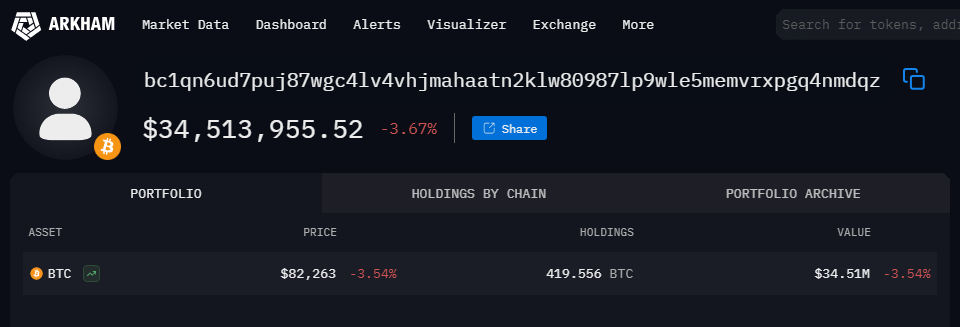

Source: Arkham
The funds remain in the new wallet at the time of this report. This movement follows a larger transfer last week when the government reportedly shifted 1,664 BTC ($144.57 million) to several different addresses.
Bhutan Maintains Significant Crypto Holdings
The Royal Government of Bhutan owns significant Bitcoin holdings, despite recent sales. Bhutan, based on Bitcoin Treasuries data, owns 13,029 BTC at a value of $1,061,269,247. This puts the nation fourth in total Bitcoin owned among countries, just behind El Salvador.

Source: Bitcoin Treasuries
The landlocked Buddhist-majority country has emerged as an offbeat contributor to the cryptocurrency world. Bhutan reportedly mines Bitcoin by leveraging its abundant hydroelectric resources. This most recent stockpile of cryptocurrency constitutes a sizable portion of the total economy — 31% of the country’s gross domestic product (GDP), estimated at nearly $3 billion.
Market Response Following The News
The cryptocurrency market appears unaffected by Bhutan’s Bitcoin movements. According to price data, Bitcoin recovered from a low of $81,014 to reach $82,005 before slightly pulling back. This represents a 2.5% rebound within a day.
The leading cryptocurrency traded at $82,401 at the time of the report, showing a nearly 1% increase over 24 hours. If this upward trend continues, Bitcoin could achieve its third consecutive positive daily close for the first time since early January.
While Bhutan has been selling off its Bitcoin for profit, the United States is seeking to stop all sales of their balance and even expand it. Interestingly, US President Donald Trump signed an executive order last month to establish a strategic Bitcoin reserve for the nation. In the meantime, senator Cynthia Lummis has filed the Bitcoin Act, seeking to acquire 1 million BTC for the nation.
Featured image from AD, chart from TradingView

Editorial Process for bitcoinist is centered on delivering thoroughly researched, accurate, and unbiased content. We uphold strict sourcing standards, and each page undergoes diligent review by our team of top technology experts and seasoned editors. This process ensures the integrity, relevance, and value of our content for our readers.
-
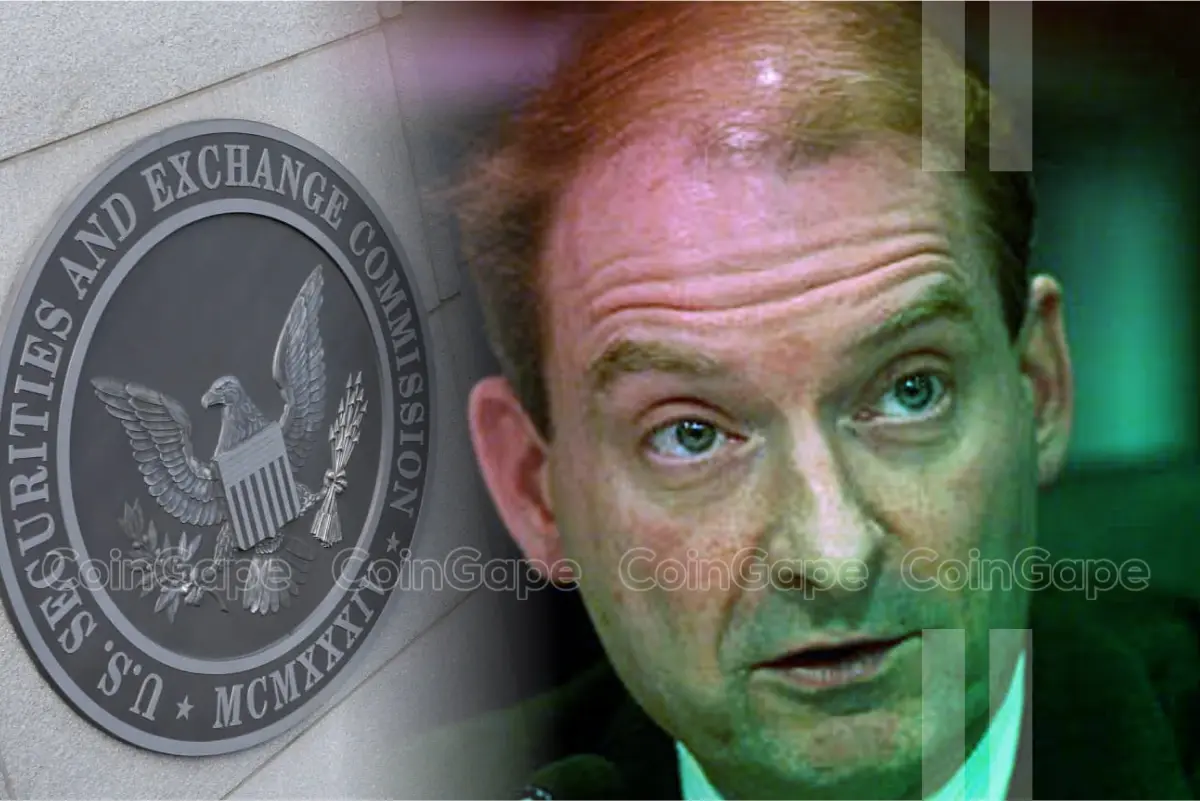
 Regulation23 hours ago
Regulation23 hours agoUS Senate Banking Committee Approves Paul Atkins Nomination For SEC Chair Role
-

 Market21 hours ago
Market21 hours agoBinance Managed 94% of All Crypto Airdrops and Staking Rewards
-
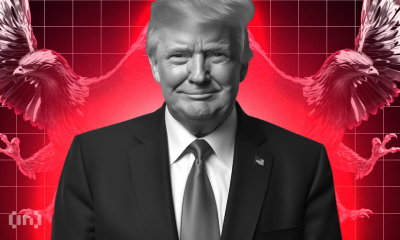
 Market23 hours ago
Market23 hours agoTRUMP Token Hits Record Low Due To Liberation Day Tariffs
-

 Regulation20 hours ago
Regulation20 hours agoUS SEC Acknowledges Fidelity’s Filing for Solana ETF
-

 Market22 hours ago
Market22 hours agoPi Network Price Falls To Record New Low Amid Weak Inflows
-

 Market20 hours ago
Market20 hours agoXRP Battle Between Bulls And Bears Hinges On $1.97 – What To Expect
-

 Market19 hours ago
Market19 hours agoRipple Shifts $1B in XRP Amid Growing Bearish Pressure
-

 Market18 hours ago
Market18 hours agoWormhole (W) Jumps 10%—But Is a Pullback Coming?


